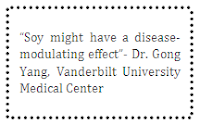Eating soy could both prevent and alter the disease course of lung cancer in women.
One
component of cancer recovery is lifestyle- and that includes diet. According to
a study conducted in China, women that consume soy before a lung cancer
diagnosis may be positively affected. This longitudinal study observed
increased mortality rates (81%) among the women in the 10th
percentile of soy consumption compared to their peers. As the 50th
percentile had the lowest mortality rates, the 90th percentile of
soy consumption, in contrast, had an 11 % increase in mortality rates. This
suggests a moderate consumption of plant derived soy foods is optimal for
mortality prevention in women.
This
experiment controlled for stages of cancer development and tumor size. It also
included an sum of individual’s daily soy intake from soy foods such as tofu,
soy sprouts, fresh green soy beans, soy milk, and other soy products. A mean
intake of 18.0 g/day for
soy food and 8.8 g/day for soy protein was concluded. The average age of
when women’s cancer diagnosis occurred was 66.3 y/o. The author notes that soy
intake had not correlation with patient characteristics such as age at
diagnosis, smoking, obesity, family history of lung cancer, tumor stage,
treatment regimens, or time between baseline dietary assessment and disease
diagnosis.
What
makes plant-derived soy to be beneficial is the estrogen content in soy foods.
On a molecular level, estrogen is produced naturally by the female body as a
sex hormone. When plant-derived soy is consumed, it acts as a selective binding
agent to this. Consequently, this research suggests that eating soy could both
prevent lung cancer among women along with alter the disease course during
treatment.
For
more information on this study please visit:








